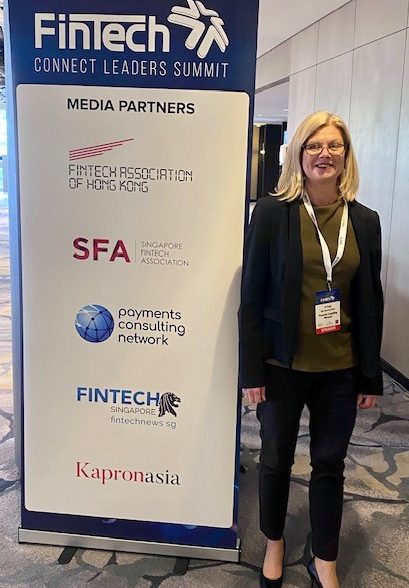Key Learnings from The Fintech Connect Leaders Summit Asia 2023
 The Fintech Connect Leaders Summit Asia was held in Singapore and ran for three days from August 28-30, 2023. In this article, Liz Beggs, Chief Operating Officer, Payments Consulting Network, shares some of her key learnings and takeaways from this conference.
The Fintech Connect Leaders Summit Asia was held in Singapore and ran for three days from August 28-30, 2023. In this article, Liz Beggs, Chief Operating Officer, Payments Consulting Network, shares some of her key learnings and takeaways from this conference.
As the premier annual meeting for CIOs, CTOs, COOs, Chief Product Officers, Heads of Digital Transformation and Payments, the event provided a unique opportunity to learn, network, and collaborate with leading banks, financial institutions, and fintech companies from across Asia.
The conference also highlighted the financial landscape across Asia with a real focus on emerging technologies and how these technologies are supporting new products and services to increase efficiencies, reduce costs and ultimately provide positive customer experiences.
Chat GPT, the metaverse, Web3, DeFi, Open banking and Crypto are all emerging technologies that are assisting in achieving these customer goals and were discussed through panel moderation over the 3 days of the conference.
There were so many discussions during the conference and would be difficult to delve into every topic. Therefore, they have been grouped under ‘themes’ that particularly resonated with Liz.
Customer Experience
The importance of use cases was at the forefront of all discussions. What are we solving for? How will the customer feel and react to the product/service being delivered? Will it be an effortless and frictionless experience?
The customer experience is at the centre of all business development, whether it be a product in Fintech or new banking product. Gone are the days where companies develop products/services and put them in the market without clearly understanding what use case they are solving for. As Jitesh Malik Director for Digital Payments and Loyalty Program at Pulse (Prudential) noted, ‘Technology is not what it is, it is what it allows you to do.’
By prioritising the customer at the center of the conversation, it allows for a well thought out and targeted approach for a great customer experience. There is no doubt that the customer is the centre of everything that we do.
Effective fraud management is also an integral part of the customer experience. Customers need to have trust and comfort that when they enter their personal details, that these details are safely protected from fraudulent activity. Consequently, robust fraud tools are essential for customer engagement.
“Technology is not what it is, it is what it allows you to do.” Jitesh Malik, Director for Digital Payments and Loyalty Program, Pulse (Prudential)
Cost Reduction & Efficiencies
We are currently navigating through demanding economic conditions, marked by rising costs of capital and diminishing liquidity in a high-interest rate environment, emphasising the importance of cost reduction.
Automating processes using Chat GPT, AI and Blockchain are helping organisations to reduce their operational costs in several ways. We are at the early stages of this journey and some of this technology is still experimental. However, we are making great advances, and this technology has already been implemented in a number of ways:
- Using Chat GPT to provide customer service has reduced headcount. By gathering the frequently asked questions and providing responses to customers using this technology, you are able to assist many customers in accessing the information they require without human intervention. However, it is important to note that this technology complements rather than replaces customer care staff, so it needs to be used in conjunction with them.
- AI is helping companies streamline their operations in several ways. For instance, companies are able to expedite the review of loan applications using AI tools. One company, Fern Software, John McGucken MD, explained that through their AI tools, they were able to successfully reduce the loan application review process from 4-5 days to a mere 5 minutes. Now this shows how AI can create efficiencies in your processes.
- Blockchain technology, whilst in its infancy, could solve for many use cases in cross-border transactions. Whilst this is not yet a reality, and there is a long way to go, there were many discussions around what this might look like. If successfully implemented in the future, blockchain has the ability to reduce time and cost enhancing transparency in cross-border transactions.
Transition
There was an overall sentiment that we are currently experiencing a transitional phase. Traditional banks face the challenge of modernising their legacy systems to digitise their product offerings and processes, aiming to create efficiencies and meet customer demands in a highly competitive landscape. Customers are wanting faster turnaround times without compromising quality of service.
If traditional banks choose to build these solutions internally, they will need to reskill their current staff, to enable them to digitise current products and processes so they are able to deliver more rapidly into the market to ensure they remain competitive. For example, IT professionals must shift from a ‘Waterfall’ approach to an ‘agile’ one, which cannot be achieved without the proper training component.
Other considerations for traditional banks are to contemplate whether to purchase or partner to bring products/services to the market, instead of developing them internally or in-house. Each option offers its own set of advantages and disadvantages, with the main consideration being cost, suitability of the solution, solutions to the identified use cases, appropriate support, ROI and speed and time to market.
It is fair to say that it is easier to be a digital bank rather than digitising within a bank. Whilst digital banks don’t have to grapple with legacy systems, they still have their own challenges. They are starting from scratch and must ensure that they are operating effectively within the regulatory framework, guarantee liquidity and establish an effective customer acquisition strategy which can result in a substantial marketing cost.
Explore the Fintech Connect Leaders Asia benchmarking Report for valuable insights, perspectives, and tools from industry leaders. With guidance, you can assess your position in the landscape and identify areas for potential growth and improvement.
Author: Liz Beggs, Chief Operating Officer, Melbourne, Payments Consulting Network
Liz Beggs is a versatile and results focused leader with over 25 years of multi-industry experience in consulting and management. She delivers value add, innovative solutions to internal and external clients with subject matter expertise in commercial cards and payments technology systems, drawing on her broad commercial GM level experience in corporate services and product management.
***
If you enjoyed reading this article and would like to be notified when future articles are posted, please sign up for our email newsletter.
Are you interested in reading articles on a particular payments topic, company, payments industry executive or author? Click the search icon, it’s that magnifying glass on the top right-hand side of the website and type in the keywords that interest you. You will then be presented with a list of any articles that match your search criteria.




